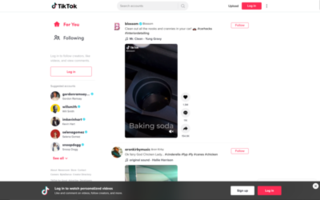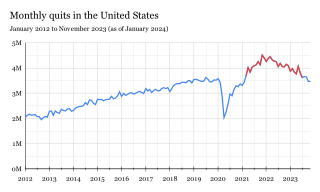Related Research Articles
Work-to-rule, also known as an Italian strike or a slowdown in United States usage, called in Italian a sciopero bianco meaning "white strike", is a job action in which employees do no more than the minimum required by the rules of their contract or job, and strictly follow time-consuming rules normally not enforced. This may cause a slowdown or decrease in productivity if the employer does not hire enough employees or pay the appropriate salary and consequently does not have the requirements needed to run normally.

Teleperformance SE is a French multinational business process outsourcing company founded in 1978 with headquarters in France. It provides services for debt collection, telemarketing, customer relationship management, content moderation, and communication.

ByteDance Ltd. is a Chinese internet technology company headquartered in Haidian, Beijing and incorporated in the Cayman Islands.

TikTok, whose mainland Chinese and Hong Kong counterpart is Douyin, is a short-form video hosting service owned by Chinese internet company ByteDance. It hosts user-submitted videos, which can range in duration from three seconds to 60 minutes. It can be accessed with a smart phone app.

Zhang Yeming is a Chinese internet entrepreneur. He founded ByteDance in 2012, developed the news aggregator Toutiao and the video sharing platform Douyin .Zhang is one of the richest individuals in the world, with an estimated net worth of US$45.6 billion as of October 2024, according to Forbes and US$43.1 billion according to Bloomberg Billionaires Index. ref> On November 4, 2021, Zhang stepped down as CEO of ByteDance, completing a leadership handover announced in May 2021. According to Reuters, Zhang maintains over 50 percent of ByteDance's voting rights.

Charli Grace D'Amelio is an American social media personality. She was a competitive dancer for over a decade before starting her social media career in 2019, when she began posting dance videos on the video-sharing platform TikTok. She quickly amassed a large following and subsequently became the most-followed creator on the platform in March 2020 until she was surpassed by Khaby Lame in June 2022. With over 155 million followers, she is the second most-followed person on TikTok, as of 2024.

Bryce Michael Hall is an American social media personality. He is most known for his videos on TikTok and YouTube. As of October 9, 2023, his TikTok account has 24 million followers, and his YouTube channel has 3 million subscribers.

Many countries have imposed past or ongoing restrictions on the video sharing social network TikTok. Bans from government devices usually stem from national security concerns over potential access of data by the Chinese government. Other bans have cited children's well-being and offensive content such as pornography.

The Longest Johns are an English folk musical group from Bristol, England, consisting of Andy Yates, Jonathan "JD" Darley, and Robbie Sattin. They are known for performing folk music and sea shanties in the English tradition, and they also compose and record their own music. They gained popularity from their rendition of the folk song "Wellerman", which went viral on TikTok in early 2021.

The Great Resignation, also known as the Big Quit and the Great Reshuffle, was a mainly American economic trend in which employees voluntarily resigned from their jobs en masse, beginning in early 2021 during the COVID-19 pandemic. Among the most cited reasons for resigning included wage stagnation amid rising cost of living, limited opportunities for career advancement, hostile work environments, lack of benefits, inflexible remote-work policies, and long-lasting job dissatisfaction. Most likely to quit were workers in hospitality, healthcare, and education. In addition, many of the resigning workers were retiring Baby Boomers, who are one of the largest demographic cohorts in the United States.
Tang ping is a Chinese slang neologism that describes a personal rejection of societal pressures to overwork and over-achieve, such as in the 996 working hour system, which is often regarded as a rat race with ever diminishing returns. Tang ping means choosing to "lie down flat and get over the beatings" via a low-desire, more indifferent attitude towards life.

A devious lick was a challenge in which North American middle school and high school students posted videos of themselves stealing, vandalizing, or showing off one or more items they stole in their school, typically from a bathroom. The trend went viral on TikTok in 2021 and has resulted in the arrests of many students as well as various warnings being issued by police departments. It also allegedly spread to some schools in Latin America, England, Germany, Australia and Latvia.

BeReal is a French social-networking app released in 2020, developed by Alexis Barreyat and Kévin Perreau. Its main feature is a daily notification that encourages users to share photos with friends of themselves and their day-to-day life given a randomly selected two-minute window every day. Critics noted its emphasis on authenticity, which some felt crossed the line into the mundane. The name "BeReal" is a pun. Its primary reference relates to its focus on users uploading unpolished photos, while also being a pun of the term B-reel.
A lazy girl job is an easy, usually white-collar, job with good pay where an employee can quiet quit. The term was coined in 2023 by Gabrielle Judge, also known by screen name "antiworkgirlboss" on Instagram, in response to hustle culture, the Great Resignation, and worker exploitation. Although the trend is centered around women, she says men can have lazy girl jobs too. Judge explained the term was a marketing gimmick in order to raise awareness about "toxic workplace expectations" and is not about celebrating laziness.
Bare minimum Monday (BMM), also known as minimum effort Monday or minimal Mondays refers to an initiative by employees to do the minimal amount of work necessary on Mondays, which mark the start of the work week. This may also involve starting the work day later and prioritizing self-care activities. In doing so, employees alleviate the stress and anxiety associated with the beginning of the work week by making Mondays more manageable and less overwhelming.
In human resources, resenteeism refers to a form of professional dissatisfaction wherein individuals choose to remain in unfulfilling jobs breeding resentment and a sense of entrapment. This is because they either unable to find a more applicable position, or are concerned about the perceived risks associated with changing employment. Individuals experiencing resenteeism will have poor employee engagement and may appear disillusioned, embittered, miserable, and unhappy. Resenteeism arose following the COVID-19 pandemic and the Great resignation where people reevaluated their work-life balance in the face of cost-of-living increases and is an extension of quiet quitting. Resenteeism is a form of occupational burnout.
In human resources, quiet thriving refers to employees who actively craft their job in order to stay engaged and improve their mental state. Quiet thriving provides employees with a sense of agency that builds resilience and allows employees to find purpose in their roles and reduces occupational burnout. Quiet thriving may lead to additional career opportunities.
In human resources, quiet hiring refers to the practice of having an employee take on a new responsibilities or a role within their company due to need. The role may be temporary or permanent, and the reassignment may not align with employee interests. Quiet hiring often occurs during economic slowdowns as a cost-saving measure.
In human resources, rage applying refers to the application to a large number of jobs, typically online, when an employee is fed up with their current role. An individual may be prompted to begin rage applying after they've been denied a promotion or raise, feeling unrecognized, or under appreciated. Rage applying is a response to quiet quitting and may be felt as a form of empowerment or revenge against an employer. Rage applying can also allow an individual to understand their current market value.
References
- ↑ Madell, Robin; Snider, Susannah (Aug 25, 2023). "What Is Loud Quitting?: An alternative to "quiet quitting" and "bare minimum Mondays" is loud quitting". U.S. News & World Report . Retrieved 18 June 2024.
- ↑ "Explained: What Is 'Loud Quitting' - The New Viral Workplace Trend". IndiaTimes. 23 April 2024. Retrieved 18 June 2024.
- 1 2 Roller, Alison (11 August 2023). "Quiet quitting vs. loud quitting: A step-by-step guide to identify, understand and mitigate". HRMorning. Retrieved 18 June 2024.
- ↑ "Loud quitting: what is it and why HR should be talking about it". imercer. July 28, 2023. Retrieved 18 June 2024.
- ↑ Kelly, Jack (Jun 26, 2023). "'Loud Quitting' Is The Next Step From 'Quiet Quitting,' 'Bare Minimum Mondays' And 'Acting Your Wage'". Forbes. Retrieved 18 June 2024.
- ↑ Magee, Tamlin (7 May 2024). "Three-minute explainer on... loud quitting". Raconteur. Retrieved 18 June 2024.
- ↑ Tong, Goh Chiew (28 June 2023). "1 in 5 employees are 'loud quitting.' Here's why it's worse than 'quiet quitting'". CNBC. Retrieved 18 June 2024.
- ↑ Kindelan, Katie (July 12, 2023). "Frustrated employees are 'loud quitting': What to know about the trend". Good Morning America. Retrieved 18 June 2024.
- 1 2 Dennison, Kara. "Quitting Your Job: Quiet Quitting Is Going Loud (But Is That a Good Thing?)". University of Phoenix. Retrieved 18 June 2024.
- ↑ Lahiri, Indrabati (April 22, 2024). "'Loud quitting': What is it and how does it affect businesses?". euronews. Retrieved 18 June 2024.
- 1 2 Pickup, Oliver (19 April 2023). "WTF is Quittok – and why Gen Z is increasingly doing it when they leave jobs". WorkLife. Retrieved 18 June 2024.
- ↑ Tatum, Megan (March 27, 2023). "Why workers are live-quitting on TikTok". www.bbc.com. Retrieved 18 June 2024.

